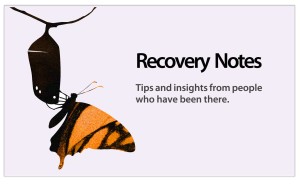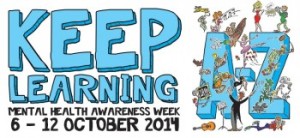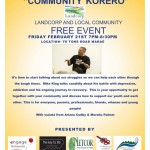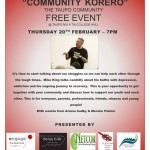
Five things I’ve learned about supporting friends in distress
Recovery Note #2
by Sheree Veysey
As a person who has experienced my fair share of mental distress and who now works in the counselling field, I have learned a few things about how to be there for someone who is upset and how to ask others to be there for me. I wish this list had been available for me to give my friends and supporters in times past – I lost a few of them, at least partly because of the stress that supporting a friend who has longer term “stuff” going on put on our relationship.
1. You don’t need to fix: you don’t need to make someone feel better
We live in a fixing culture, and often when someone tells us what’s going on for them, we jump immediately to problem solving, or ideas for the person to do things differently to make them feel different. This is often not helpful as frequently the person can feel that they are not heard. This may also give the message that their less pleasant feelings are somehow ‘wrong’ and that if they tried harder to ‘fix’ them they would not have issues…
Instead of aiming to help someone feel better, if we concentrate on listening to their experience and validating it then often the person will walk away feeling heard, less alone, (and not surprisingly often feeling a touch better). Validating people’s feelings and experience is about just acknowledging where they are: “I can see how you would feel that…” “Wow, that’s a lot going on” “No wonder you feel overwhelmed.”
The opposite is invalidation (e.g. “I don’t see what the big deal is.” “There’s no reason to get so upset”) which can leave people feeling isolated and awful about themselves.
2. Friend and support versus therapist…
If someone is dealing with high levels of distress, then I would be strongly encouraging them to be engaged with health services (doctor, counselling, psychologist, mental health services) rather than just using friends for support. Counsellor’s and others who work with people in distress receive comprehensive training and regular supervision. Part of the reason they are able to offer such intensive listening and support to a person is because of this- and also because the time they give has boundaries around it and clear expectations.
When we try to be there for someone in a lot of distress outside of these professional relationships, often we start out with lots of energy and listening time and empathy. However, if the distress is not short lived, we often run into problems because we have not put boundaries around our time and availability. We tell our friend to call us at any time of the day and night- and when they start doing this, the supporter can be left burnout, not wanting to hear from their friend, guilty about feeling this way and sometimes even experiencing what is called ‘vicarious trauma’ from listening to really difficult and traumatic experiences.
If you are aware of this pitfall, then you can set some boundaries with the person. Boundaries are our friends! Some of these may not need to be discussed and you can just hold them in your own head, others you might like to talk about. You need to be clear about where your lines in the sand are about what you can and cannot offer: Are there things you don’t feel able to talk about with the friend and you would prefer they saw a professional? How late is it okay to call? What about if they are intoxicated? What if they are feeling that they might harm themselves? What if they want to stay over?
3. Think long haul
The boundary setting above is crucial if you intend to keep this person in your life long term.
I have had times in my life when a dear friend has let me know she isn’t available for any support at this time. While in the moment I would have preferred it to be different, I also understood that her letting me know this was about her wish to be a friend for the long haul and to do this, she needed to prioritise her wellbeing.
I would far rather have her in my life for years to come, than lose this friendship because she got exhausted. In return I have learned to set similar boundaries with friends in distress – letting them know I care very deeply but I don’t have the capacity for support right now. I would always encourage people to be developing a number of supports for themselves- I feel it leads to far healthier relationships.
Some people experiencing distress are hyper aware of asking for ‘too much’, and as a result often won’t ask for support they need because of their fear. Talking about this issue can really encourage them to reach out at the appropriate time, knowing you will be able to say “not today” if you need to.
4. Reciprocity
When I was a teenager I had a good friend who didn’t tell me until weeks afterward that she was living with another family for a while because her parents were fighting and might be splitting up. I asked her why she hadn’t told me, and she said that she didn’t want to put any other stress on me because I was having such a hard time. I heard her thoughtfulness, but at the same time I was dismayed, because I didn’t just want a friend- I wanted the chance to be a friend. I would have liked to take the opportunity to give back to her with some listening and support. Our friendships work best when there are vaguely equal amounts of give and take- so don’t be afraid to ask your friend who is distressed for things you might need. If they can’t give this at the time- well this is also a good chance for them to practice boundary setting and say no (remember- boundaries are our friends).
5. Look after yourself
You matter, and you need to keep an eye on your own well-being. Sometimes when someone we love is really struggling we can tell ourselves we should just keep giving and giving to them because they are having a harder time than us. In the long term, this really does not do ourselves or them any good.
Don’t underestimate the stress of having someone you care about really struggling. Good sleep, a wide variety of food, some sunshine and physical activity are all important! Turn to your supports, and even think about seeing a professional if you feel you need to. This is great modelling to our friends, families and children.
Arohanui
Sheree Veysey
_ _ _ _
Sheree Veysey is a counsellor from Auckland offering counselling and coaching via Skype and face to face at www.lifeinprogress.co.nz. Her own journey toward wellbeing inspired her to work with people and offer them the compassion that helped her healing. Sheree is also a writer, dog owner, auntie and part-time performer.
_ _ _ _
Read Recovery Note #1: Five things I’ve learned about food and my mood














